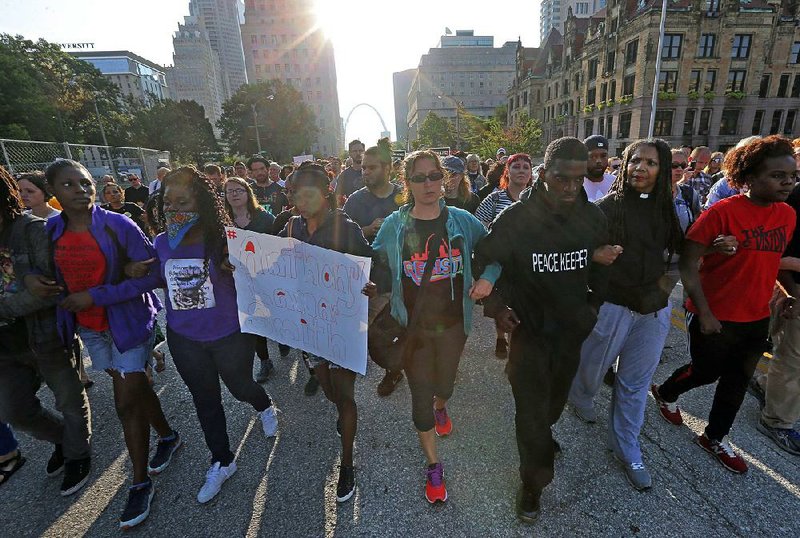ST. LOUIS -- A racially mixed crowd of demonstrators locked arms and marched quietly through downtown St. Louis on Monday morning to protest the acquittal of a white former police officer in the killing of a black suspect, after another night of unrest and more than 100 arrests.
The latest action follows three days of peaceful protests and three nights of vandalism and unrest in the city that has been rocked since Friday, when a judge announced he found Jason Stockley innocent in the 2011 death of Anthony Lamar Smith.
Hundreds of riot police mobilized downtown late Sunday, arresting more than 100 people and seizing weapons amid reports of property damage and vandalism. The arrests came after demonstrators ignored orders to disperse, police said.
"I'm proud to tell you the city of St. Louis is safe and the police owned tonight," interim Police Chief Lawrence O'Toole said at a news conference early Monday.
On Sunday, more than 1,000 people had gathered at police headquarters and then marched without trouble through downtown St. Louis. By nightfall, most had gone home.
But the 100 or so people who remained grew increasingly agitated as they marched back toward downtown. Police originally said more than 80 people were arrested after demonstrators toppled large planters, broke windows and threw things at officers. But spokesman Leah Freeman said Monday that the arrest total Sunday topped 100.
According to police, the demonstrators then sprayed bottles with an unknown substance on officers. One officer suffered a leg injury and was taken to a hospital. His condition wasn't known.
Soon afterward, buses brought in additional officers in riot gear, and police scoured downtown deep into the night, making arrests and seizing at least five weapons, according to O'Toole. Later, officers in riot gear gathered alongside a city boulevard chanting "whose street, our street" -- a common refrain used by the protesters -- after clearing the street of demonstrators and onlookers.
[Read about recent fatal shootings by police across the country.]
"We're in control. This is our city, and we're going to protect it," O'Toole said.
Mayor Lyda Krewson said at the same Monday news conference that "the days have been calm and the nights have been destructive" and that "destruction cannot be tolerated."
Police were facing scrutiny after an unmarked police vehicle backed quickly into a crowd Sunday night.
Spokesman Schron Jackson said police were arresting two suspects near the agency's downtown headquarters when someone started throwing rocks at officers.
Police detained that person in a blue Impala. Jackson said a crowd then moved threateningly toward the unmarked police car, which backed up to safety. She said no injuries have been reported.
But the American Civil Liberties Union of Missouri says that was dangerous and criminal. The ACLU wants the police driver to be placed on inactive duty pending an investigation.
Early Monday, more than 150 protesters marched arm-in-arm, some carrying signs, to City Hall. Police turned traffic away as the marchers blocked a busy St. Louis street during the rush hour crush. Once at City Hall, they found their voices, chanting: "I know that we will win." The protesters then marched four blocks to a city court building, where they chanted again, then dispersed. The next protest was scheduled for Monday evening in University City.
Also Monday, high school students in at least two suburban districts protested the Stockley ruling. In Kirkwood, about 100 students walked out and held a brief rally, while 250 students in Webster Groves staged what school officials described as a peaceful demonstration.
The recent St. Louis protests follow a pattern seen since the August 2014 killing of Michael Brown in nearby Ferguson: The majority of demonstrators, though angry, are law-abiding. But as the night wears on, a subsection emerges, a different crowd more willing to confront police, sometimes to the point of clashes.
Protest organizer Anthony Bell said he understands why some act out: While change can come through peaceful protests, such as those led by Dr. Martin Luther King Jr., years of oppression has caused some to turn violent.
"I do not say the [unruly] demonstrators are wrong, but I believe peaceful demonstrations are the best," Bell said.
Many protesters believe police provoked demonstrators by showing up in riot gear and armored vehicles; police said they had no choice but to protect themselves once protesters started throwing things at them.
A Section on 09/19/2017
